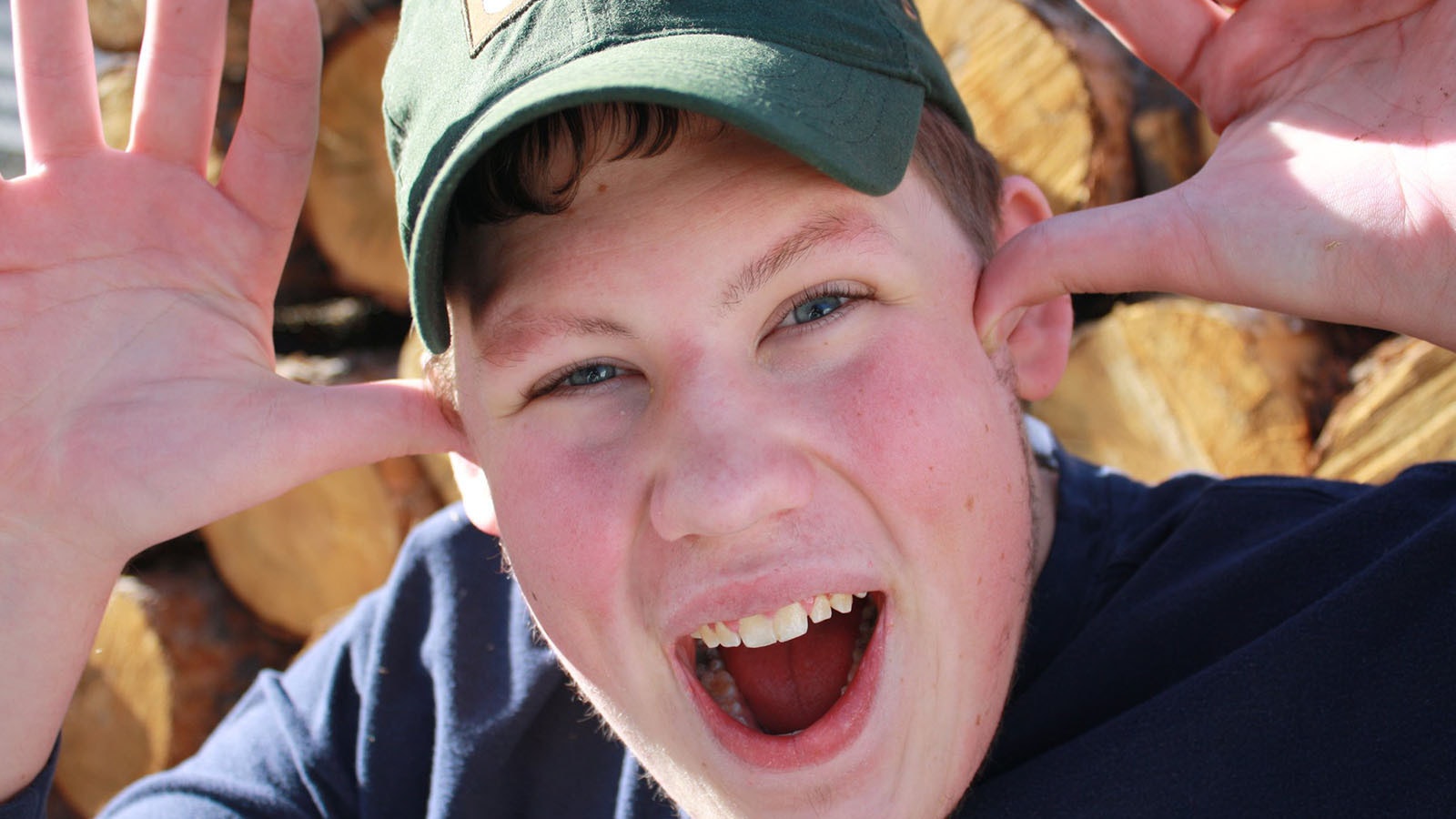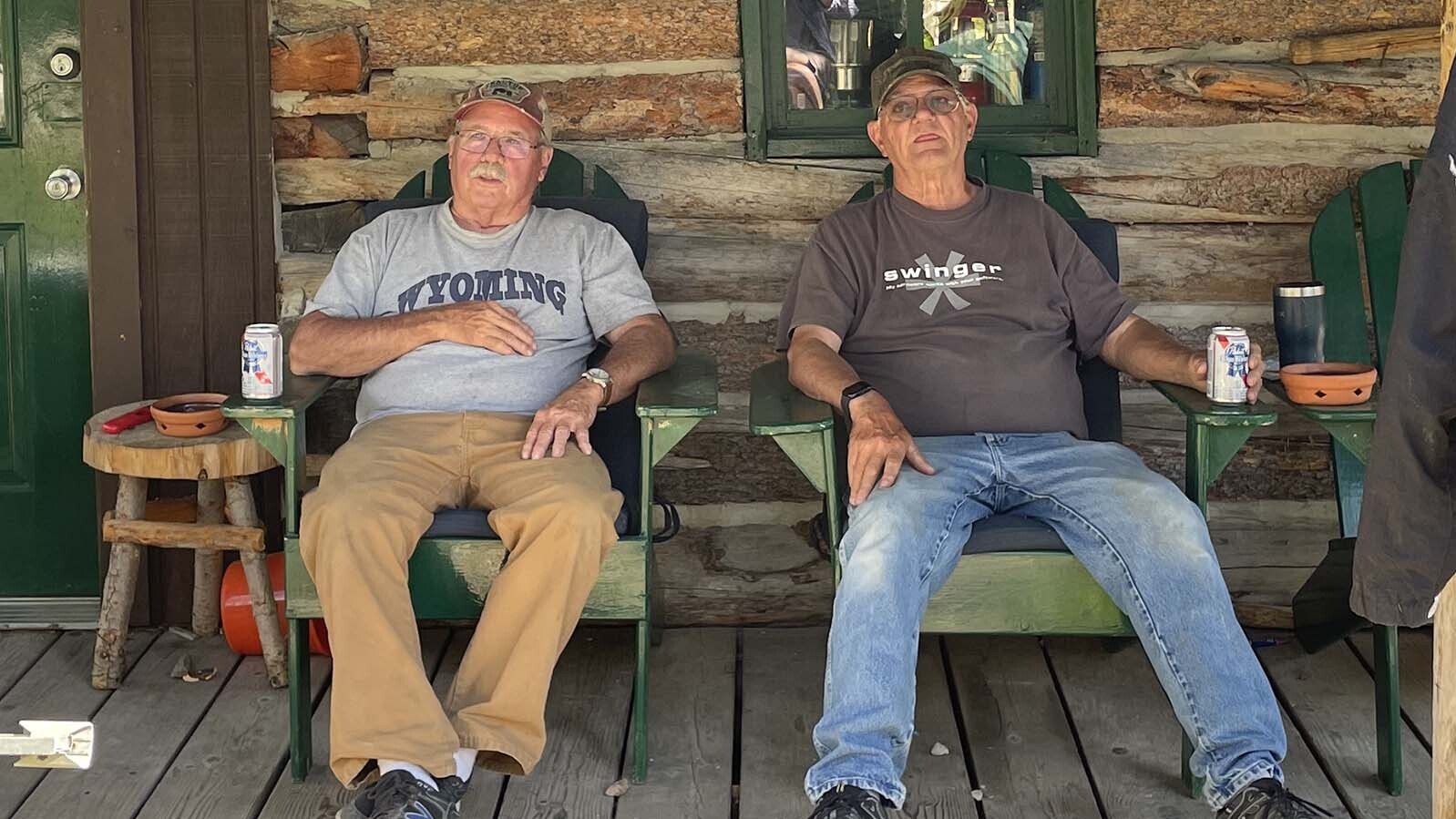By Renée Jean, Business and Tourism Reporter
renee@cowboystatedaily.com
Kurmudgeon Kups were a big hit at the Frontier Mall in Cheyenne on Small Business Saturday, and so was their creator, Jonathon DeVries.
The mugs featured grumpy frowns and funny things DeVries has said to friends and family members, like, “Being an adult is not for me!” The back of that mug has a big grumpy frown.
The saying, meanwhile, is a favorite, mom Vicki DeVries told Cowboy State Daily. It’s Jonathon’s first thought anytime someone suggests he do something adultish that he doesn’t want to do.
Living With Autism
Jonathon, 32, has autism. He was not just “dipped” in autism, as Vickie DeVries’ daughter puts it. “He was dunked.”
The business that revolves around him is their creative solution to the lifelong challenges Jonathon faces in finding his place in the world.
“Sometimes, when something doesn’t exist for a person with different needs, you have to get creative and develop it for them,” Vickie said.

The Tasmanian Devil Stage
Jonathon was diagnosed with autism almost 30 years ago. Like many families with autistic children at that time, just getting a diagnosis was an arduous task.
Vicki DeVries found herself, more often than not, being blamed for what was happening to her son.
“They kept putting notes in his chart,” she said. “’Parent needs parenting classes.’ ‘Child was out of control.’ I mean, they made all these comments, but nobody stopped to ask what’s going on when they have an older child who’s sitting here in the chair behaving, you know, not attacking mom, or anything like that.”
It took a year and a half before Vicki finally found a doctor who would listen, without judgment, as she explained her very real concerns, which ranged from her son’s slower-than-normal development to his wild “Tasmanian devil” behavior.
“He was just very aggressive toward us,” she recalled. “He hadn’t developed any, you know by 16, 18 months of age, he wasn’t talking yet. He was behind on everything.”
Finally, when the family was living in California, Vickie called yet another pediatrician for help. It just so happened that this time, the doctor also had a child with special needs.
“And I did say to him when we took him in, I think he might have autism, because I’d read an article, and everything just kind of went from there,” she said.
One In 10,000
At that time, autism was still a very uncommon diagnosis, maybe 1 in 10,000 children. It was barely recognized and hardly understood.
“There wasn’t really anything they could tell me about what to expect, what not to expect,” she said.
It also was common in the beginning days of autism being recognized to blame “unemotional and cold” mothers for their children’s plight.
“Thank God we’ve passed that part,” Vickie said.
Positive Intervention
Despite these limitations, Jonathon still was able to access good early intervention, which is key for better outcomes for children with autism.
There have been many setbacks along the way, Vicki said, including a court battle in Wyoming with their school district that ultimately came back in her son’s favor.
She credits the “village” of family and community with helping her keep Jonathon home for as long as she did.
“He had a teacher who really took an interest in him, and she taught him how to read, so he does read,” Vicki recalled. “He probably reads about second, maybe third grade level. He doesn’t understand the concept of math or time.”
But give Jonathon a legal pad and a fresh Sharpie, and he enjoys writing out his funny sayings, and he enjoys making things like grumpy frowns. They make him laugh and smile.
TinMan Productions
The business idea, meanwhile, came about organically. Jonathon had a habit of making firewood kindling.
“He was really obsessive about it,” Vickie said.
There came to be so much kindling, in fact, that it started to become a problem. Vicki started placing it in bags for sale and called the effort TinMan Productions, because Jonathon loves “The Wizard of Oz.”
Making mountains of kindling might have been different, and to some perhaps stressful, but for Vickie it brought a sense of relief.
Here was something productive her son could do, an outlet for his energy. She held that idea close to her heart.
Evolution Of The Idea
And then, after about two years of that her son announced one day that he was tired of making kindling.
“His needs changed,” she said, adding that her heart also was struck with fear.
What was going to become of her son?
But the business idea soon began to evolve into something that could better suit her son’s new needs. From that evolution came funny, witty sayings and, finally, the development of Kurmudgeon Kups.
Then heck, why not Kurmdugeon Kards and Kurmudgeon Khristmas ornaments, too?
The backs of the cups get the trademark grumpy face that today makes everyone, not just Jonathon, smile.
“TinMan Productions made a profit for the first time this year,” Vickie said.
More Than A Business
But the business is about far more than making money. It’s really all about Johnathon and his life, his story, his fight to belong in a society that’s often impatient with those who are different.
“Autism is a beautiful thing,” his main caregiver, Taylor Robinson, told Cowboy State Daily. “I’ve worked in this field for six years now with people with autism and I have family members who are autistic as well. Each one of them offer something different. They see the world in a different light than all of us.”
That perception could manifest in little ways, like stopping to admire the beauty of a single branch, for example. Things most of us miss in our hurry-worry days.
Robinson was with Jonathon at Frontier Mall for a three-day TinMan Productions popup shop. It was a great chance for life lessons.
That day, he learned to introduce himself. Instead of whistling to get attention, he learned to instead say, “Excuse me, allow me to introduce myself,” and, “I’m Jonathon Taylor DeVries with TinMan Productions.”
That day was one of the business’ most successful ever, Vickie said.
They took one order for 50 mugs, and the business made a profit for the first time.
Uncertain Future
The interaction made Vickie feel good about the path her son is now on, though she still has many worries about his future.
She and her husband Tim are growing older and face more health problems. That prompted the Glenrock couple to place Jonathon with a full-time program, Treasure Abilities in Cheyenne, three years ago.
“With doing what’s best for him comes a lot of heartache,” Vickie said. “It sucks, but we always try to keep that in mind, what’s best for him long-term.”
She and her husband hope doing this now, instead of waiting until one or both parents have passed away, will ease the transition for Jonathon in the future. He won’t have to deal with their deaths and moving into a new living situation all at once.
Planning Ahead
The family also has set up an Enable Savings Plan to help their son as well, which allows savings of up to $100,000 for future disability-related expenses without affecting SSI or Medicaid.
“My dream goal would be to buy like an apartment complex where he’d have his own apartment, and then you strategically place people in the apartments around him as a support and kind of a checks and balance system,” Vickie said. “People who would keep an eye out for him, you know. Not necessarily staff, but a family member.
“That would be our ideal goal, because then he’s not the one having to move anytime something goes wrong with the living situation.”
That’s a real concern, Vickie added. She knows of a girl with autism who has been moved no fewer than 22 times as circumstances changed for her.
But the apartment is not a certain dream by any means. The family’s own retirement is not where it should be either, Vickie said, in part from the need for at least one parent to stay home with Jonathon these many years.
But the family takes life’s challenges one day at a time and, for now, are just thankful to have found a program willing to work with their son, to help him develop both his small business and his independence.
“Jonathon lives in a world that doesn’t understand him,” Vickie said. “He has to figure out how to live here.”
Even after his parents are finally gone.





